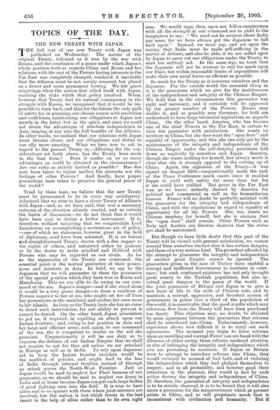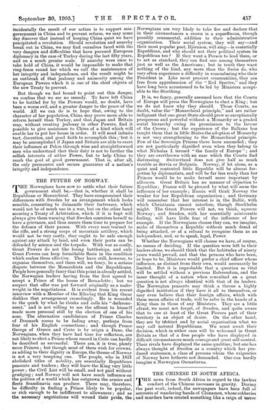T HE full text of our new Treaty with Japan was
published on Wednesday. The nature of the original Treaty, followed as it was by the war with Russia, and the conclusion of a peace under which Japan's whole position both as regards China and Korea and her relations with the rest of the Powers having interests in the Far East was completely changed, rendered it inevitable that the Alliance must be not merely renewed, but placed on a firmer and more permanent footing. We felt grave misgivings when the nation first allied itself with Japan, realising the risks which that policy involved. When, however, that Treaty had its natural consequence in the struggle with Russia, we recognised that it would be im- possible to turn back, and that for the future the only path of safety lay in pursuing our chosen course with resolution and confidence, maintaining our obligations to Japan not merely in the letter but in the spirit, and since we could not retain the advantages of absolute independence in Asia, reaping at any rate the full benefits of the Alliance. In other words, we realised that our relations with Japan must become closer, and our obligations and duties to our ally more exacting. What we have now to ask in regard to the present Treaty is,—Allowing for the con- siderations set forth above, has the Treaty been made in the best form ? Does it confer on us as many advantages as could be obtained in the circumstances ? Are our risks as strictly limited as possible ? Has due care been taken to injure neither the interests nor the feelings of other Powers ? And finally, have proper precautions been taken to preserve the general peace of the world ?
Tried by these tests, we believe that the new Treaty must be pronounced to be in every way satisfactory. Admitted that we were to have a closer Treaty of Alliance with Japan—and, as we have said, that was a necessary outcome of the situation already created, and so outside the limits of discussion—we do not think that it would have been easy to devise a better instrument. It is, therefore, without misgiving that we congratulate Lord Lansdowne on accomplishing a momentous act of policy, —one of which no statesman, however great in the field of diplomacy, need have been ashamed. It is an honest and straightforward Treaty, drawn with a due respect to the rights of others, and untainted either by jealousy or by the desire to make mischief and ill-blood with Powers who may be regarded as our rivals. As far as the signatories of the Treaty are concerned, the essential point is the mutual guarantee of their posses- sions and interests in Asia. In brief, we say to the Japanese that we will guarantee to them the possession of the special position which they have won in Korea and Manchuria. This we are able to do owing to our com- mand of the sea. Japan's danger—and if she stood alone it would be a very grave danger—is from a coalition of Powers superior to her at sea, who might cut her off from her possessions on the mainland, and confine her once more to her islands. As long as the Treaty lasts she has no cause to dread such intervention, for our ability to prevent it cannot be denied. On the other hand, Japan guarantees to Aid us, if required, in repelling an attack upon our Indian frontiers ; and, owing to her position in Asia and her large and efficient army, and, again, to our command of the sea, she is competent to render us the aid she promises. Unquestionably it will be our duty so to organise the defence of our Indian Empire that we shall not require to ask for that aid unless we are attacked in Europe as well as in India. To rely upon Japanese aid. to keep the Indian frontier inviolate would be the maddest of policies, and might lead to the loss of India through internal troubles instead of through an attack across the North-West Frontier. Just as Japan would be mad to neglect her Fleet because of our guarantee, so we should be mad to neglect our Army in India and at home because Japan can put such large bodies of good. fighting men into the field. It is wise to have allies and to co-operate with them where joint interests are involved, but the nation is lost which trusts in the last resort to the help of allies rather than to its own right arm. We would urge, then, upon our fellow-countrymen with all the strength at our command not to yield to the temptation to say : " We need not be anxious about India any more, for we have always got the Japanese .to back upon." Instead, we must say, and act upon the saying, that India must be made self-sufficing in the matter of defence, and also be able, if we are called upon by Japan to carry out our obligations under the Treaty, to send her military aid. In the same way, we trust that the Japanese will not be content to rely too much upon our Fleet, but within reasonable limits of expenditure will make their own naval forces as efficient as possible.
So much for the Treaty as it concerns ourselves and the Japanese. For the outside world the essential thing in it is the guarantee which we give for the maintenance of the independence and integrity of the Chinese Empire. We hold that in the circumstances this guarantee was right and necessary, and it certainly will be approved. by the greater number of the Powers. Russia may dislike it, and so possibly may Germany, for both are understood to have large territorial aspirations as regards China. On the other hand, America, who has become one of the chief Powers in the Far East, is certain to view the guarantee with satisfaction. She wants no territory in China, but she does want the " open door " and equality of opportunity, and this she can only get by the maintenance of the integrity and independence of the Chinese Empire under the self-denying provisions laid. down so explicitly by ourselves and Japan. America, though she wants nothing for herself, has always made it clear that she is strongly opposed to the cutting up of China. Again, the signature of the Treaty—it was signed on August 12th—unquestionably made the task of the Peace Conference much easier, since it enabled Japan to yield with safety far more than but for it she could have yielded. But peace in the Far East was, as we know, ardently desired. by America for political and commercial as well as for humanitarian reasons. France will no doubt be perfectly satisfied. with the guarantee for the integrity and independence of China, and with the stipulations in regard to equality of opportunity for all the Powers. She, too, wants no Chinese territory for herself, but she is anxious that the "open door" shall remain. Other Powers such as Italy and Austria are likewise desirous that the status quo shall be maintained.
But though we have little doubt that this part of the Treaty will be viewed. with general satisfaction, we cannot conceal from ourselves the fact that it has certain dangers, and those of a very serious kind. The precedent afforded by the attempt to guarantee the integrity and independence of another great Empire cannot be ignored. The guarantees given in the case of Turkey have enabled a corrupt and inefficient Government to continue in exist- ence; but such continued existence has not only brought great misery to the Turkish population, but also in- volved great dangers to the peace of the world. If the joint guarantee of Britain and Japan is to give a new lease of life to the evils of Chinese rule, and to maintain a, corrupt, oppressive, and decadent system of government in power over a third of the population of the world, it is conceivable that the good results which may otherwise flow from the Treaty will have been purchased. too dearly. This objection may, no doubt, be obviated by some agreement between the guarantors that reforms shall be introduced into China. Unfortunately, however, experience shows how difficult it is to carry out such agreements. The moment you begin to force reforms upon an unwilling and corrupt Power you are faced with the dilemma of either seeing those reforms rendered abortive, or else of infringing the integrity and independence which you are professing to maintain. If Japan or Britain were to attempt to introduce reforms into China, they would certainly be accused of bad faith, and of violating the independence which they had pledged themselves to respect; and in all probability, and however good their intentions in the abstract, they would in fact by such action destroy the integrity and independence of China. If, therefore, the guarantee of integrity and independence is to be strictly observed, it is to be feared that it will also mean a guarantee for the misgovernment which at present exists in China, and so will perpetuate much that is inconsistent • with civilisation and humanity; - But if incidentally the result of our action is to support mis- government in China and to prevent reform, we may some day discover that instead of keeping China quiet we have precipitated a revolution. Should revolution and anarchy break out in China, we may find ourselves faced with the very dangers and difficulties that have pursued European diplomacy in the case of Turkey during the last fifty years, and on a much greater scale. If anarchy were once to take hold of China, it would be impossible to make that ring-fence round her which we call the maintenance of her integrity and independence, and the result might be an outbreak of that jealousy and animosity among the European Powers which it is one of the chief objects of the new Treaty to prevent.
But though we feel bound to point out this danger, we confess that we see no remedy. To have left China to be battled for by the Powers would, no doubt, have been a worse evil, and a greater danger to the peace of the world. All we can do is to hope that, owing to the character of her population, China may prove more able to reform herself than Turkey, and that Japan and Britain may, without creating jealousy in other Powers, find it possible to give assistance to China of a kind which will enable her to put her house in order. It will need infinite tact, discretion, and good faith to accomplish this ; *but it may be accomplished if Japan and Britain are able to exert their influence at Pekin through wise and straightforward men who understand that their duty is not to further the selfish interests of either Power, but to help China to reach the goal of good government. That is, after all, the only permanent and secure guarantee of a nation's integrity and independence.











































 Previous page
Previous page